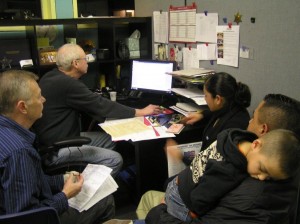You know something strange is happening when a group of people who have never paid taxes before turn up at tax time and demand to pay back taxes – going all the way back to 1992.
That’s what happened this spring as Puente staff and volunteers sat down to process tax returns. Of the 72 participants who showed up to take advantage of Puente’s pro bono tax services, some were first-timers who had lived for years in the area as undocumented residents but had never filed a tax return, says Puente Program Director Rita Mancera.
“They brought all their W2s and all these old, crusty papers. They said. ‘If I have to pay anything, I want to pay it now.’”

Mancera attributes this turn of events to the eagerness with which hundreds of South Coast residents would like to obtain legal status in America. They’re approaching Puente for help because they want to create a paper trail in anticipation of immigration reform.
“People keep asking, ‘Should I do my taxes?’ We tell them that now more than ever it’s important, because that’s one of the first things they’re going to ask people to provide – copies of their income tax returns,” Mancera says.
As Congress gears up to debate the prospect of offering legal status to as many as 11 million residents, economists say one aspect is beyond debate: the $2 billion estimated annual fiscal windfall in state and local taxes.
Many workers without a Social Security number still file tax returns using an ITIN, or Individual Taxpayer Identification Number, recognized by the IRS. Mancera says dozens of locals do it every year.
But having a Social Security number entitles someone to better tax credits and benefits, including an earned income tax credit for low-income families. Mancera says that qualifying families get a $1,000 tax credit for each child under 17. Those who file with an ITIN get only a portion of that.
Puente staff members and volunteers are discussing how to expand the tax program as demand grows. Mancera says there’s a group that is already committed to filing taxes every year from now on, regardless: young people reporting their first job income, including those who have temporary work permits thanks to DACA. (Deferred Action for Childhood Arrivals, an executive order signed June 15, 2012 by President Obama).
For more information about becoming a volunteer tax preparer, call (650)879-1691 ext. 114 or email Abby Mohaupt at amohaupt@mypuente.org.
